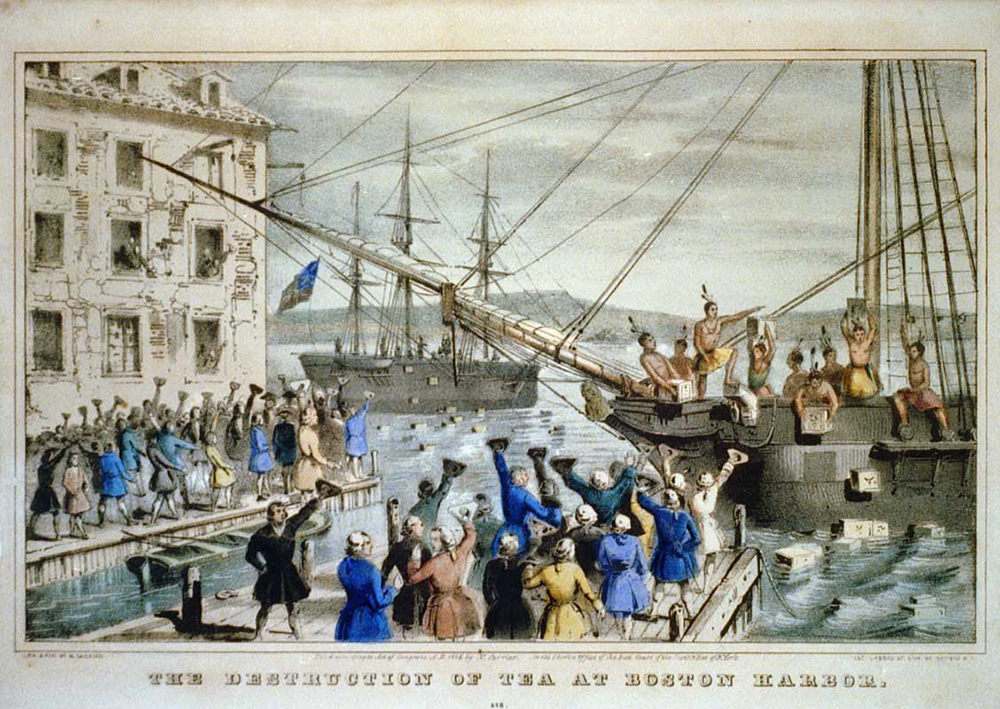The Tea Act of 1773 didn’t start the revolution, but it added to the fire.
After the Seven Years War with France ended, King George III was basically broke and began imposing a series of taxes on colonists to rebuild wealth. He first levied a tax on tea and other goods imported to the colonies as part of the Townshend Revenue Act in 1763.
Americans resisted the taxes because they weren’t represented in the British government. “No taxation without representation!” became their rallying cry. The British government repealed all the taxes except the one on tea.
As a result, many colonists boycotted British tea. Some drank smuggled Dutch tea as an act of resistance; it was cheaper because it wasn’t subject to taxes, although it was poorer quality.
The Tea Act passed 10 years later wasn’t designed to make the crown money, but to bail out the East India Company, which had a monopoly on importing tea to the colonies. Although the tax on tea wasn’t being raised, the Tea Act allowed the East India Company to bypass London and sell directly to the colonies. This made the tea cheaper for colonists, but it also cut out colonial merchants who had been reselling tea, and it competed with the prices of smuggled Dutch tea, which also affected colonial trade.
Colonists learned of the Tea Act while seven ships loaded with tea were en route to North American shores. One each were destined for New York, Philadelphia, and Charleston. Four were headed to Boston.
Crowds of protestors gathered to prevent the East India Company ships from unloading their cargo, and the tea consignees were forced to resign or return the tea to England. The tactic worked everywhere but Boston, where the governor of Massachusetts convinced the tea consignees, two of which were his sons, to hold their ground. They were in a standoff.
British law required ships to unload and pay duties within 20 days or their cargo would be confiscated. Samuel Adams held a mass meeting which passed a resolution he introduced urging the captain of the first ship to arrive in Boston, the Dartmouth, to go back without unloading. They also appointed 25 men to watch the ship constantly and prevent the tea chests from being unloaded.
Governor Hutchinson refused to grant Dartmouth permission to leave without paying the duty. Two more tea-laden ships arrived in the harbor.
On December 16, 1773, the last day to pay the tax, 30-130 men (some dressed as Mohawk warriors to disguise their faces and symbolically align with America over Britain) snuck onto the ships. Over the course of three hours, they smashed open 342 tea chests and dumped 92,000 pounds of tea into the harbor. This act of defiance became known as the Boston Tea Party.
The English Parliament was furious and responded with the Coercive Acts of 1774, which colonists came to call the Intolerable Acts. They punished Boston for the Tea Party by repealing the colonial charter of Massachusetts and closing the port of Boston until the colonists reimbursed the cost of the destroyed tea. They also appointed a British commander as governor of Massachusetts.
Resistance acts and tension increased until colonists declared themselves independent on July 4, 1776. In the declaration they listed taxes as one of the reasons they left.
The people of Boston re-enact the Tea Party in colonial garb every year on December 16. Let’s hope they’re not throwing good tea into the harbor!

